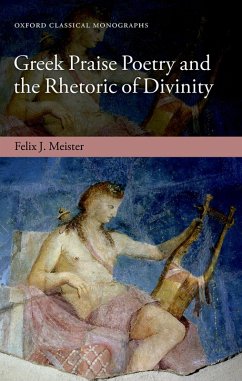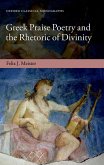The polar dichotomy between man and god, and the insurmountable gulf between them, are considered a fundamental principle of archaic and classical Greek religion. Greek Praise Poetry and the Rhetoric of Divinity argues that poetry produced between the eighth and the fifth centuries BC does not present such a uniform view of the world, demonstrating instead that particular genres of poetry may assess the distance between humans and gods differently. Discussion focuses on genres where the boundaries appear to be more flexible, with wedding songs, victory odes, and selected passages from tragedy and comedy taken as case studies that illustrate that some human individuals may, in certain situations, be presented as enjoying a state of happiness, a degree of beauty, or an amount of power comparable to that of the gods. A central question throughout is whether these presentations stem from an individual poet's creative ingenuity or from the conventional ideological repertoire of the respective genre, and how this difference might shape the comparison of a human with the gods. Another important question concerns the ritual contexts in which some of these songs would have been performed, expanding the scope of the analysis beyond merely a literary device to encompass a fundamental aspect of archaic and classical Greek culture.
Dieser Download kann aus rechtlichen Gründen nur mit Rechnungsadresse in A, B, BG, CY, CZ, D, DK, EW, E, FIN, F, GR, HR, H, IRL, I, LT, L, LR, M, NL, PL, P, R, S, SLO, SK ausgeliefert werden.









